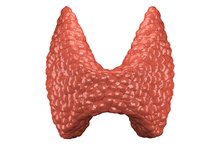Iodine & Selenium Dosage for Thyroid Problems
The thyroid, a butterfly-shaped gland found in the neck, produces hormones that affect nearly all other cells and tissues in your body, making thyroid hormone vital for maintaining normal function. To produce thyroid hormone, the gland requires iodine, a relatively rare element that forms only 0.000006 percent of the earth’s crust. Selenium, another element, stimulates the formation of specialized proteins known as selenoproteins that also help regulate thyroid function. Failing to intake the proper amounts of these elements can lead to thyroid problems.
Thyroid Hormone Production
The thyroid gland traps iodine and combines the iodine with the amino acid tyrosine to form thyroid hormones. The thyroid produces two types of thyroid hormone: thyroxine, T4; and triiodothyronine, T3. Although the thyroid produces more T4 than T3, in an approximately 80 to 20 percent ratio, T3 is the more active form, possessing about four times the strength of T4, according to Endocrineweb 4. Specific selenoproteins produced by combining selenium with proteins in the body stimulate the conversion of T4 to T3.
- The thyroid gland traps iodine and combines the iodine with the amino acid tyrosine to form thyroid hormones.
- Specific selenoproteins produced by combining selenium with proteins in the body stimulate the conversion of T4 to T3.
Thyroid Problems
What Are the Causes of Fluctuating Thyroid Levels?
Learn More
Thyroid problems may cause an over- or underproduction of thyroid hormone. Since thyroid hormone affects nearly all tissues in the body, too much or too little of the hormone causes a variety of symptoms. Failure to intake enough iodine or selenium in your diet can inhibit the production of thyroid hormones leading to a condition known as hypothyroidism. The University of Maryland Medical Center reports hypothyroidism affects approximately 2 percent of the people in the United States, with women 10 times more likely to develop the condition than men 3. Hypothyroidism causes fatigue, sluggishness, constipation, puffy face, sensitivity to cold, weight gain, muscle weakness and depression.cause:
- Hypothyroidism causes fatigue
- sluggishness
- constipation
- puffy face
- sensitivity to cold
- weight gain
- muscle weakness
- depression
Although most doctors treat hypothyroidism by prescribing synthetic thyroid hormone, if your diet is deficient in iodine or selenium, increasing your intake to the daily recommended dosage may help relieve your symptoms.
- Thyroid problems may cause an over- or underproduction of thyroid hormone.
- Since thyroid hormone affects nearly all tissues in the body, too much or too little of the hormone causes a variety of symptoms.
Iodine
Although it is important to get enough iodine in your diet, you must be careful about taking iodine supplements as too much iodine can stimulate the production of too much thyroid hormone leading to hyperthyroidism, another thyroid complication. The Institute of Medicine recommends adults consume 150 micrograms of iodine per day. Because the thyroid traps and stores iodine, a short-term deficiency usually causes no problems. Since the production of iodized salt, the incidence of thyroid problems due to iodine deficiency in the United States is rare; however, 30 percent of the world’s population still suffers from insufficient iodine intake, according to the Linus Pauling Institute 2.
- Although it is important to get enough iodine in your diet, you must be careful about taking iodine supplements as too much iodine can stimulate the production of too much thyroid hormone leading to hyperthyroidism, another thyroid complication.
- Since the production of iodized salt, the incidence of thyroid problems due to iodine deficiency in the United States is rare; however, 30 percent of the world’s population still suffers from insufficient iodine intake, according to the Linus Pauling Institute 2.
Selenium
Can I Eat Seaweed If I Have Hyperthyroidism?
Learn More
Your body incorporates selenium into proteins making selenoproteins. Some selenoproteins act as antioxidants, substances that protect cells from damage cause by negatively charged particles produced during chemical reactions within the body. Other selenoproteins function as enzymes, promoting reactions in your body. A selenium deficiency can decrease the amount of T3, creating symptoms of hypothyroidism. The Institute of Medicine recommends adults get 55 micrograms of selenium per day. Several foods, such as:
- tuna
- eggs
- rice
- serve as good sources of selenium
- but Brazil nuts contain the highest concentration
- providing 544 micrograms per ounce
- Your body incorporates selenium into proteins making selenoproteins.
- Other selenoproteins function as enzymes, promoting reactions in your body.
Related Articles
References
- National Institutes of Health Office of Dietary Supplements: Selenium; November 2009
- Linus Pauling Institute: Iodine; Victoria Drake; March 2010
- Endocrineweb: How the Thyroid Works; October 2010
- American Thyroid Association. Iodine Deficiency. 2020.
- Eastman CJ, Zimmermann MB. The iodine deficiency disorders. In: Feingold KR, Anawalt B, Boyce A, et al., editors. Endotext. South Dartmouth, MA: MDText.com, Inc. Updated February 6, 2018.
- Ahad F, Ganie SA. Iodine, Iodine metabolism and Iodine deficiency disorders revisited. Indian J Endocrinol Metab. 2010;14(1):13-17.
- Kostoglou-athanassiou I, Ntalles K. Hypothyroidism - new aspects of an old disease. Hippokratia. 2010;14(2):82-87.
- American Thyroid Association. Hypothyroidism in Children and Adolescents. 2020.
- National Institutes of Health, Office of Dietary Supplements. Iodine. Updated July 9, 2019.
- U.S. National Library of Medicine. Congenital hypothyroidism. Updated February 11, 2020.
- Johnson LE. Iodine. Merck Manual Professional Version. Updated October 2018.
- Murthy MB, Krishnamurthy B. Severe irritant contact dermatitis induced by povidone iodine solution. Indian J Pharmacol. 2009;41(4):199-200. doi:10.4103/0253-7613.56069
- Puchalski AR, Chopra IJ. Radioiodine treatment of differentiated thyroid cancer despite history of 'iodine allergy'. Endocrinol Diabetes Metab Case Rep. 2014;2014:130084. doi:10.1530/EDM-13-0084
- Schabelman E, Witting M. The relationship of radiocontrast, iodine, and seafood allergies: a medical myth exposed. J Emerg Med. 2010;39(5):701-707. doi:10.1016/j.jemermed.2009.10.014
- National Institutes of Health, Office of Dietary Supplements. Iodine. Updated July 9, 2019.
- American Cancer Society. Radioactive Iodine (Radioiodine) Therapy for Thyroid Cancer. Updated March 14, 2019.
- Centers for Disease Control and Prevention. Potassium iodide (KI). Updated April 4, 2018.
- Kalra S, Unnikrishnan AG, Sahay R. The hypoglycemic side of hypothyroidism. Indian J Endocrinol Metab. 2014;18(1):1-3.doi:+10.4103/2230-8210.126517
Resources
Writer Bio
Stephanie Chandler is a freelance writer whose master's degree in biomedical science and over 15 years experience in the scientific and pharmaceutical professions provide her with the knowledge to contribute to health topics. Chandler has been writing for corporations and small businesses since 1991. In addition to writing scientific papers and procedures, her articles are published on Overstock.com and other websites.








